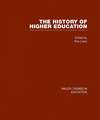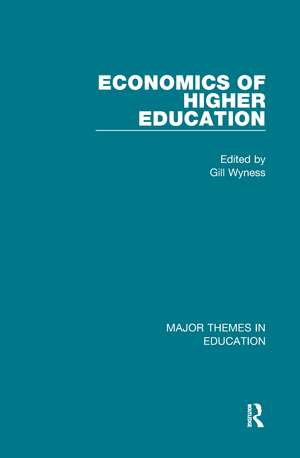The Economics of Higher Education: Major Themes in Education
Editat de Gillian Wynessen Limba Engleză Hardback – 25 oct 2018
Din seria Major Themes in Education
-
 Preț: 6595.43 lei
Preț: 6595.43 lei - 18%
 Preț: 6612.83 lei
Preț: 6612.83 lei - 34%
 Preț: 4228.73 lei
Preț: 4228.73 lei - 34%
 Preț: 2111.19 lei
Preț: 2111.19 lei - 34%
 Preț: 4387.08 lei
Preț: 4387.08 lei - 34%
 Preț: 5240.46 lei
Preț: 5240.46 lei - 34%
 Preț: 4376.48 lei
Preț: 4376.48 lei - 34%
 Preț: 7029.76 lei
Preț: 7029.76 lei - 34%
 Preț: 7038.12 lei
Preț: 7038.12 lei - 34%
 Preț: 4241.85 lei
Preț: 4241.85 lei - 33%
 Preț: 2876.67 lei
Preț: 2876.67 lei - 34%
 Preț: 7039.74 lei
Preț: 7039.74 lei - 34%
 Preț: 4240.24 lei
Preț: 4240.24 lei - 34%
 Preț: 5352.30 lei
Preț: 5352.30 lei - 34%
 Preț: 4522.13 lei
Preț: 4522.13 lei - 34%
 Preț: 6479.43 lei
Preț: 6479.43 lei - 34%
 Preț: 6180.43 lei
Preț: 6180.43 lei - 34%
 Preț: 6738.77 lei
Preț: 6738.77 lei - 34%
 Preț: 7595.82 lei
Preț: 7595.82 lei - 34%
 Preț: 4385.88 lei
Preț: 4385.88 lei - 34%
 Preț: 6741.21 lei
Preț: 6741.21 lei - 34%
 Preț: 6745.31 lei
Preț: 6745.31 lei - 34%
 Preț: 3631.24 lei
Preț: 3631.24 lei - 34%
 Preț: 7590.91 lei
Preț: 7590.91 lei - 34%
 Preț: 6464.08 lei
Preț: 6464.08 lei - 34%
 Preț: 5354.33 lei
Preț: 5354.33 lei - 34%
 Preț: 3827.51 lei
Preț: 3827.51 lei - 34%
 Preț: 5365.74 lei
Preț: 5365.74 lei - 34%
 Preț: 6188.99 lei
Preț: 6188.99 lei - 34%
 Preț: 7857.85 lei
Preț: 7857.85 lei - 34%
 Preț: 6191.03 lei
Preț: 6191.03 lei - 34%
 Preț: 6698.07 lei
Preț: 6698.07 lei - 34%
 Preț: 6732.66 lei
Preț: 6732.66 lei - 34%
 Preț: 5301.30 lei
Preț: 5301.30 lei
Preț: 5579.67 lei
Preț vechi: 8488.34 lei
-34% Nou
Puncte Express: 8370
Preț estimativ în valută:
1067.62€ • 1114.81$ • 881.64£
1067.62€ • 1114.81$ • 881.64£
Comandă specială
Livrare economică 25 martie-08 aprilie
Doresc să fiu notificat când acest titlu va fi disponibil:
Se trimite...
Preluare comenzi: 021 569.72.76
Specificații
ISBN-13: 9781138669314
ISBN-10: 1138669318
Pagini: 1454
Ilustrații: 164
Dimensiuni: 156 x 234 mm
Greutate: 0.45 kg
Ediția:1
Editura: Taylor & Francis
Colecția Routledge
Seria Major Themes in Education
Locul publicării:Oxford, United Kingdom
ISBN-10: 1138669318
Pagini: 1454
Ilustrații: 164
Dimensiuni: 156 x 234 mm
Greutate: 0.45 kg
Ediția:1
Editura: Taylor & Francis
Colecția Routledge
Seria Major Themes in Education
Locul publicării:Oxford, United Kingdom
Public țintă
Postgraduate and UndergraduateCuprins
The Economics of Higher Education: Major Themes in Education
Edited by Gillian Wyness
Introduction
Section 1: The Economics of HE
Edited by Gillian Wyness
Introduction
Section 1: The Economics of HE
- J. Hartog, ‘Human Capital as an Instrument of Analysis for the Economics of Education’, European Journal of Education, 35, 1, 2000, 7-20.
- Jacob Mincer: ‘Education, Experience and the Distribution of Earnings’, in Education, Income and Human Behaviour (Cambridge, MA: NBER, 1975), pp. 71-94.
- M. Spence, ‘Job Market Signalling’, The Quarterly Journal of Economics, 87, 3, 1973, 355–374.
- P. Aghion, L. Boustan, C. Hoxby and J. Vandenbussche, ‘The Causal Impact of Education on Economic Growth: Evidence from U.S.’, Department of Economics: Harvard University, 2009, pp. 1-73
- J. Blanden, P. Gregg and L. Macmillan, ‘Accounting for Intergenerational Income Persistence: Noncognitive Skills, Ability and Education’, Economic Journal 117, 2007, C43-C60.
Section 2: Returns to HE: Empirical Evidence
- David Card, ‘The Causal Effect of Education on Earnings’, in O. Ashenfelter and D. Card (eds), Handbook of Labor Economics, 3, (North Holland: Elsevier, 1999), pp. 1801-1863.
- Janet Currie and Enrico Moretti. Mother's Education and the Intergenerational Transmission of Human Capital: Evidence from College Openings’, The Quarterly Journal of Economics, 118, 4, 2003, 1495-1532.
Heterogeneity of returns
- L. Kirkoboen, E. Leuven and M. Mogstad., ‘Field of Study, Earnings, and Self-Selection’, Quarterly Journal of Economics, 131, 2016, 1057-1111.
- S. Dale, and A. Krueger, ‘Estimating the Effects of College Characteristics over the Career Using Administrative Earnings Data’, Journal of Human Resources, 49, 2014, 323-358.
- J. Britton., L. Dearden, N. Shephard and A. Vignoles ‘How English Domiciled Graduate Earnings Vary with Gender, Institution Attended, Subject and Socio-Economic Background’, IFS Working Paper 16/06, 2016. Institute for Fiscal Studies, London, pp. 1-63
- L. Macmillan, C. Tyler and A. Vignoles, ‘Who Gets the Top Jobs? The Role of Family Background and Networks in Recent Graduates’ Access to High Status Professions’, Journal of Social Policy, 44, 3, 2015, 487-515
.
Section 3. Who Goes to College: Scio-economic and Other Gaps in Participation - J. Blanden and S. Machin, ‘Educational Inequality and the Expansion of UK Higher Education’, Scottish Journal of Political Economy, 51, 2, 2004, 230–249.
- J. Blanden, and Machin, S. ‘Educational Inequality and The Expansion of United Kingdom Higher Education’, Scottish Journal of Political Economy, 60, 5, 2013, pp 597-598.
- M. Bailey and S. Dynarski, ‘Inequality in Postsecondary Education’, in J. Duncan and R. Murnane (eds), Whither Opportunity: Rising Inequality, Schools, and Children’s Life Chances (New York: Russell Sage Foundation, 2011), pp. 117-131.
- P. Arcidiacono, E. Aucejo, P. Coate and V Joseph Hotz, ‘Affirmative Action and University Fit: Evidence from Proposition 209’, IZA Journal of Labor Economics, 3, 1 2014, 1-29.
- Flavio Cunha and James J. Heckman, ‘The Technology of Skill Formation’, AEA Papers and Proceedings, 97, 2, 2007, 31-47.
- H. Chowdry, C. Crawford, L. Dearden, A. Goodman and A. Vignoles, ‘Widening Participation in Higher Education: Analysis Using Linked Administrative Data’, Journal of the Royal Statistical Society: Series A (Statistics in Society), 176, 2013, 431–457.
- V. Boliver, ‘How Fair is Access to More Prestigious UK Universities?’, British Journal of Sociology, 64, 2013, 344–364.
- C. Hoxby and C. Avery, ‘The Missing One-offs: The Hidden Supply of High Achieving Low Income Students’, NBER Working Paper No. 18586, 2012, 1-48.
Information and Education Decisions - J. Dominitz and H. Manski. ‘Eliciting Student Expectations of the Returns to Schooling’, Journal of Human Resources, 31, 1, 1996, 1–26.
- M. McGuigan, S. McNally and G. Wyness, ‘Student Awareness of Costs and Benefits of Educational Decisions: Effects of an Information Campaign’, Journal of Human Capital, 10, 4, 2016, 482–519.
- E. Bettinger, B. Long, P. Oreopoulos and L. Sanbonmatsu, ‘The Role of Simplification and Information in College Decisions: Results from the H&R Block FAFSA Experiment’, Working Paper no. 15361, 2009, NBER, 1-45.
- Christopher Avery and Thomas J. Kan, ‘Student Perceptions of College Opportunities: The Boston COACH Program’, inCollege Choices: The Economics of Where to Go, When to Go, and How to Pay for It (Chicago: University of Chicago Press, 2004), pp. 355-394.
Section 4. Who does Well in College?
The Higher Education Production Function - Bruce Sacerdote, ‘Peer Effects with Random Assignment: Results for Dartmouth Roommates’, The Quarterly Journal of Economics, 116, 2, 2001, 681–704.
- Scott E. Carrell, Richard L. Fullerton and James E. West, ‘Does Your Cohort Matter? Measuring Peer Effects in College Achievemen’, Journal of Labor Economics, 27, 3, 2009, 439-464.
Dropout and Performance
- J. Bound and S. Turner, ‘Dropouts and Diplomas: The Divergence in Collegiate Outcomes’, in E. Hanushek, S. Machin and L. Woessmann (eds), Handbook of the Economics of Education (North Holland: Elsevier, 2011), pp. 573–613.
- C. Crawford, ‘Socio-economic Differences in University Outcomes in the UK: Drop-out, Degree Completion and Degree Class’, IFS Working Paper W14/31, Institute for Fiscal Studies, 2014, 1-29.
- C. Crawford, P. Gregg, L. Macmillan, A. Vignoles and G. Wyness, ‘Higher Education, Career Opportunities, and Intergenerational Inequality’,Oxford Review of Economic Policy, 32, 4, 2016, 553-575.
- A. Light and W. Strayer, ‘Determinants of College Completion: School Quality or Student Ability?’, The Journal of Human Resources, 35, 2, 2000, 299–332.
Section 5. Financial Aid and Higher Education
Impact on Participation - N. Barr, ‘Higher Education Funding’, Oxford Review of Economic Policy, 20, 2, 2004, 264-283.
- S. Dynarski and J. Scott-Clayton, ‘Financial Aid Policy: Lessons from Research’, The Future of Children, 23, 1, 2013, 67-91.
Quasi-experimental - T. J. Kane, ‘Rising Public College Tuition and College Entry: How Well do Public Subsidies Promote Access to College?’, No. w5164, National Bureau of Economic Research, 1995, 1-45.
- S. Dynarski. ‘Does Aid Matter? Measuring the Effect of Student Aid on College Attendance and Completion’, American Economic Review, 93, 2003, 279–288.
- N. Seftor and S. Turner, ‘Back to School: Federal Student Aid Policy and Adult College Enrollment’, Journal of Human Resources, 37, 2002, 336–352.
- L. Dearden, E. Fitzsimons and G. Wyness. ‘Money for Nothing: Estimating the Impact of Student Aid on Participation in Higher Education’, Economics of Education Review, 43, 2014, 66–78.
- S. Dynarski, ‘Hope for Whom? Financial Aid for the Middle Class and its Impact on College Attendance’, National Tax Journal, 53, 2000, 629–661
- S. Dynarksi, ‘Building the Stock of College Educated Labor', Journal of Human Resources, 43, 3, 2008, 576-610.
Financial Aid Policies – Impact on Attainment
- L. Schudde and J. Scott-Clayton, ‘Pell Grants as Performance-Based Aid? An Examination of Satisfactory Academic Progress Requirements in the Nation’s Largest Need-Based Aid Program’, Research in Higher Education, 57, 8, 2016, 943–967.
- P. Garibaldi, F. Giavazzi, A. Ichino and E. Rettore. ‘College Cost and Time to Complete a Degree: Evidence from Tuition Discontinuities’, Review of Economics and Statistics, 94, 3, 2012, 699–711.
- E. Bettinger, ‘How Financial Aid Affects Persistence’, NBER Working Paper 10242, National Bureau of Economic Research, 2004, 207-237.
- R. Murphy and G. Wyness, ‘Testing Means-Tested Aid’, CESIfo Working Paper No. 6105, 2016, 1-43.
- Sara Goldrick-Rab, et al. ‘Reducing Income Inequality in Educational Attainment: Experimental Evidence on the Impact of Financial Aid on College Completion’, American Journal of Sociology, 121, 6, 2016, 1762-1817.
Notă biografică
Dr Gillian Wyness is Senior Lecturer in Economics of Education at the UCL Institute of Education, and a Research Associate at the Centre for Economic Performance at LSE.
Descriere
The intersection of economics and higher education has never been more apparent. Increasingly, economic principles are applied to analyses of education and education policy. This new title meets the need for an authoritative reference work to codify and make sense of the field’s burgeoning literature.
